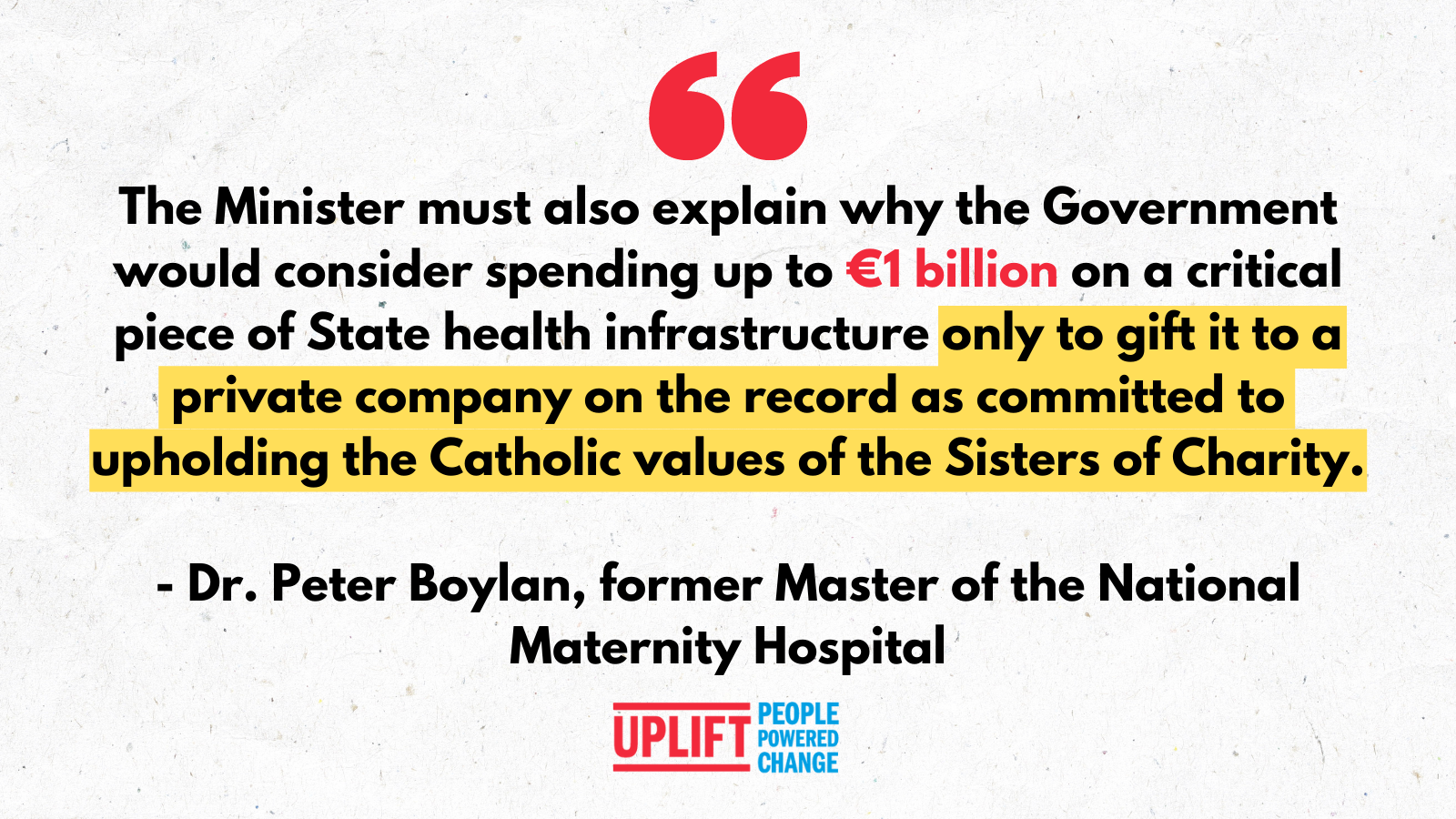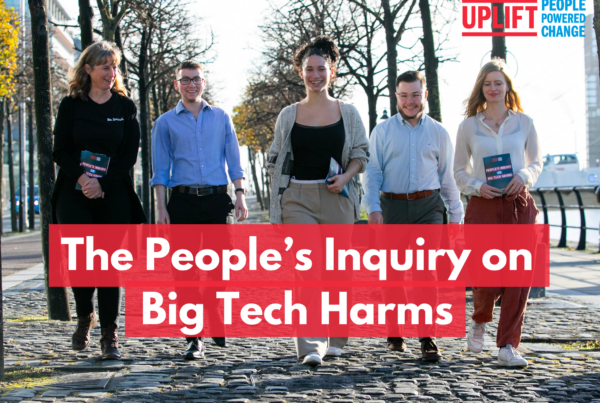
Expert legal counsel Stephen Dodd SC has scrutinised case law, legislation, the constitution, and has concluded that in the interest of the common good – the state is justified to CPO the land currently owned by the RSC.
Senior Counsel’s opinion answers six key questions about a CPO of the Elm Park site, and makes clear that a CPO is indeed a practical proposition.
“Overall, I am of the view that the State could present a compelling case to meet the test to justify the compulsory acquisition of the Elm Park site.” [p. 61]
1. What is the case for a CPO of Elm Park?
(i) The acquisition of the lands would be for the purpose of delivering a very important development in the public interest which is the relocation of the NMH. [p. 60] (ii) The State will be expending significant monies, estimated to be €800 million (and likely to be more) in building the new NMH. From a purely financial perspective in protecting an investment, there would be public interest in owning the underlying land. [p. 60] (iii) These particular lands have been identified as the appropriate location for the NMH. The co-location and clinical benefits were identified in the 2008 KPMG report and accepted by An Bord Pleanala in 2017. [p. 60]
2. Can a CPO of Elm Park be justified?
Counsel notes that it is clear from the current proposal that the State, whether in the form of the HSE or the Minister for Health, will not own the land on which the NMH is to be located.
“It is proposed to be owned by a private company in which the State has no input whatsoever in terms of appointment of directors. It is also not entirely clear as to what mechanism ownership of the building itself will be secured by the State…” [p.29]“Insofar as ownership of the lands are not obtained, the proposed arrangements are Byzantine in their complexity, almost Kafkaesque, from which it is difficult to ascertain with certainty key matters of ownership, control and governance.” [p. 58]
Counsel concludes that:
“Arguably the matter is of such importance to the State, that there is a legitimate state interest in achieving certainty which could only be secured by the State having full control through ownership of the relevant land and assets.” [p. 31]
3. Is the Constitution a barrier to a CPO?
Counsel considers Article 44 of the Constitution and notes that the general purpose of Article 44 is to protect the practice of religion and prevent undue interference by the State. (pp. 54-6)
In the context of a CPO of Elm Park, Counsel concludes that Article 44 concerns religion in general and not property. Article 44.2.6 (Diversion of Religious Property) offers a more focused form of protection:
“The property of any religious denomination or any educational institution shall not be diverted save for necessary works of public utility and on payment of compensation.”
Counsel concludes that “the prohibition against diversion is not absolute” in terms of the question of a CPO to facilitate the NMH relocation project, and “the main issue relates to the meaning of “necessary works of public utility.” [p. 55]
“The fact that Article 44.2.6 precludes a diversion except for “works” means that the State cannot compulsorily acquire lands simply to deprive the religious denomination of assets unless it is to carry out certain works. Thus the purpose of Article 44.2.6 is primarily directed towards State oppression of religious or specific religious orders or discrimination. The acquisition of lands to carry out certain works in the public interest which are not “utilities” does not involve oppression of the religious denominations. The National Maternity Hospital would clearly constitute works of public utility in this broad sense of public use. I therefore do not consider Article 44.2.6 presents an obstacle to the compulsory acquisition of Elm Park.” [p. 56]
4. Would a CPO delay the project?
In July 2021, An Tánaiste Leo Varadkar told the Dáil that the Government was “not ruling out CPO as an option but we need to understand that the outcome of a CPO is not guaranteed and would certainly result in delay…”. [p. 2]
Counsel concludes however that:
“In terms of a delay it should be observed that the Elm Park site was identified some eight years ago in 2013 and it has been a further 5 years since the Mulvey Report was delivered. Considering the delay thus far, it may therefore be queried whether any further delay entailed by [a CPO] is significant in the scheme of things, especially in the light of the importance of this matter. Moreover, the current arrangements appear mired in controversy and so there is likely to be even further delay in terms of these proposed arrangements. Minister for Health Stephen Donnelly in response to a Dail question stated on 1 July 2021 that:
‘Timelines for the new hospital are subject both to satisfactory finalisation of the legal arrangements, and approval of the business case, and therefore not yet available.’ [p. 56]
It should be noted that the public procurement process for the building of the hospital has also not yet commenced, and there is an ongoing examination of spending on the project being conducted by the Comptroller and Auditor General, who has signalled that if issues arise a further special report may be required.
The board of the HSE has not signed off on the project either. The board minutes of 25 June 2021 record
“significant concerns about the level of assurance the legal framework provides to ensure services to be provided at the new NMH will be fully compliant with the law of the land, the State’s financial investment (both capital assets and revenue funding) will be appropriately protected, and governance arrangements are appropriate and reflect public interest.”
These issues would be resolved if the new hospital is State owned and built on State land.
5. What is the CPO process and how long would it take?
The process of making a CPO is governed by the 1947 Health Act (amended 2004). If a decision was made to make a CPO under the current legislation the steps involved comprise:
a. The making of the CPO by the HSE
b. Public Advertisement and sending of notices
c. Preparation of evidence to be presented at the likely oral hearing
d. Determination by the Minister as to whether to confirm the CPO
e. Exercise of any appeal under section 85 of the 1947, including the possibility of an appeal from the High Court.
Counsel notes that:
“While it is not possible to place a precise estimate on time involved in the process, the main delays would be the gathering of evidence and preparation for an oral hearing/inquiry. Insofar as an appeal was made to the High Court this must be exercised within three weeks of the confirmation of the order and so proceedings would have to issue in an expedited manner. Also, it might be expected that any proceedings would be given a high priority and an expeditious hearing date before the Court.” [p. 57, 65]
6. What reasons are likely to be advanced against CPO?
Counsel suggests that there may be two reasons advanced against the need for CPO.
(i) That the various interests of the State can be accomplished by certain other arrangements such as the grant of a lease and other structures proposed.
Counsel notes however that:
“The fact that a set of labyrinthine arrangements have to be devised, where the construction and implications of the same are contentious and doubtful is highly unsatisfactory. Considering the importance of the NMH and vast monies being expended by the State, there would seem to be a significant public interest in certainty in relation to these matters.” [p. 33]
(ii) SVHG’s “purported interest in retaining the lands”.
Counsel concludes that:
“[T]he approach of the RSC in declining to sell would appear to be based on the cautious and prudential principle that in not transferring ownership to the State [its] interests would best be served and ownership provides more certainty and control. A similar cautionary principle might be said to underlie concerns over State ownership of the lands in the interests of preserving clinical independence and protecting its investment.
However, the clear difference in terms of these interests is that one is a private interest which can likely be satisfied and the other is a public interest where it is open to be questioned whether it will be satisfied by the arrangements proposed. The hospital being built is a national maternity facility which is being wholly funded by the State. It would therefore seem clear that the State’s interest in ownership substantially outweighs the interests of the RSC or SVHG in retention of ownership, in particular where the interest in retention of ownership is vague and can be met by other formal agreements, arrangements or assurances.” [p. 34]Click here to read the full legal opinion


